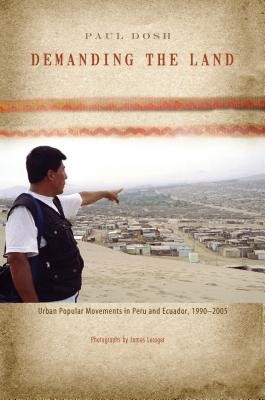
- We will send in 10–14 business days.
- Author: Paul Dosh
- Publisher: Penn State University Press
- ISBN-10: 0271037083
- ISBN-13: 9780271037080
- Format: 15.2 x 22.9 x 1.7 cm, softcover
- Language: English
- SAVE -10% with code: EXTRA
Reviews
Description
In the latter half of the twentieth century, millions of impoverished people all over Latin America participated in illegal seizures of urban land. As many cities became saturated with squatter settlements by the 1980s, it was expected that such invasions would wane. But the increased economic vulnerability and expansion of informal labor activity brought about by neoliberal government policies spurred yet more invasions. Their goals remained the same: reliable electricity, potable water, sewer drainage, and legal title to illegally acquired land. But changes in the economic and political context required different means for achieving these goals. Social safety nets were weakened, organized labor lost power, and some urban service monopolies were privatized--and the introduction of democratic municipal elections offered new avenues to secure these much-needed services. In this careful study of ten neighborhoods in Quito, Ecuador, and Lima, Peru, Paul Dosh examines these new patterns to cast light on the reasons why some neighborhood groups succeed and survive while others do not.
EXTRA 10 % discount with code: EXTRA
The promotion ends in 18d.11:18:12
The discount code is valid when purchasing from 10 €. Discounts do not stack.
- Author: Paul Dosh
- Publisher: Penn State University Press
- ISBN-10: 0271037083
- ISBN-13: 9780271037080
- Format: 15.2 x 22.9 x 1.7 cm, softcover
- Language: English English
In the latter half of the twentieth century, millions of impoverished people all over Latin America participated in illegal seizures of urban land. As many cities became saturated with squatter settlements by the 1980s, it was expected that such invasions would wane. But the increased economic vulnerability and expansion of informal labor activity brought about by neoliberal government policies spurred yet more invasions. Their goals remained the same: reliable electricity, potable water, sewer drainage, and legal title to illegally acquired land. But changes in the economic and political context required different means for achieving these goals. Social safety nets were weakened, organized labor lost power, and some urban service monopolies were privatized--and the introduction of democratic municipal elections offered new avenues to secure these much-needed services. In this careful study of ten neighborhoods in Quito, Ecuador, and Lima, Peru, Paul Dosh examines these new patterns to cast light on the reasons why some neighborhood groups succeed and survive while others do not.


Reviews